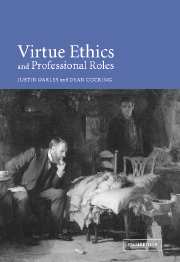Book contents
- Frontmatter
- Contents
- Preface
- Acknowledgements
- Introduction
- 1 The nature of virtue ethics
- 2 The regulative ideals of morality and the problem of friendship
- 3 A virtue ethics approach to professional roles
- 4 Ethical models of the good general practitioner
- 5 Professional virtues, ordinary vices
- 6 Professional detachment in health care and legal practice
- Bibliography
- Index
6 - Professional detachment in health care and legal practice
Published online by Cambridge University Press: 22 September 2009
- Frontmatter
- Contents
- Preface
- Acknowledgements
- Introduction
- 1 The nature of virtue ethics
- 2 The regulative ideals of morality and the problem of friendship
- 3 A virtue ethics approach to professional roles
- 4 Ethical models of the good general practitioner
- 5 Professional virtues, ordinary vices
- 6 Professional detachment in health care and legal practice
- Bibliography
- Index
Summary
People from a variety of professions commonly speak of how they distance themselves psychologically from various aspects of their professional roles. Indeed, such detachment is often seen as increasingly necessary by health-care and welfare professionals. However, the moral status of professional detachment itself is not very clear. Such detachment is sometimes regarded as a cornerstone of professionalism, where an ability to maintain an emotional distance from one's clients is thought by some to be a key part of what it means to have a professional attitude. For example, in an era of substantial cutbacks, state-employed social workers who deal with the impoverished and disadvantaged and often find themselves having to deliver bad news to their clients are urged to keep a significant degree of emotional separation between themselves and their clients, so that they are more able to carry out such requirements of their role. Similarly, doctors who regularly attend to the dying are taught how to remain somewhat emotionally removed from the plight of their patients, and relationship counsellors dealing with quarrelling couples are encouraged to provide constructive advice to both parties, without becoming ‘judgemental’ towards one party whose behaviour they might personally disapprove of. Lawyers, too, have often been told that they should not become personally concerned at the plight of their clients, but should instead, as Charles Curtis advised, strive to develop the sort of detachment displayed by the Stoics, regarding their clients’ troubles ‘vicariously’, as if they were bystanders assisting in another's emergency. As Curtis puts it, ‘if a lawyer is to be the best lawyer he is capable of being … the Stoic sage is his exemplar’.
- Type
- Chapter
- Information
- Virtue Ethics and Professional Roles , pp. 137 - 171Publisher: Cambridge University PressPrint publication year: 2001



